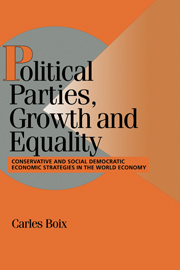 Political Parties, Growth and Equality
Political Parties, Growth and Equality Book contents
- Frontmatter
- Contents
- List of Tables and Figures
- Preface
- 1 Introduction
- 2 Political Parties and the Structural Conditions of the Economy
- 3 Supply-Side Economic Strategies from a Comparative Perspective (I): Public Investment and the Formation of Human Capital
- 4 Supply-Side Economic Strategies from a Comparative Perspective (II): The Public Business Sector and Tax Strategies
- 5 The Social Democratic Project: Macroeconomic Stability and State Intervention in Spain
- 6 The Political and Electoral Dimensions of the PSOE's Economic Strategy
- 7 Turning around the Postwar Consensus: Defining a Conservative Economic Framework in Britain
- 8 The Political and Electoral Dimensions of the Conservative Economic Strategy
- 9 Partisan Strategies and Electoral Coalitions
- 10 Conclusions
- Notes
- References
- Index
- More Titles in the Series
9 - Partisan Strategies and Electoral Coalitions
Published online by Cambridge University Press: 05 June 2012
- Frontmatter
- Contents
- List of Tables and Figures
- Preface
- 1 Introduction
- 2 Political Parties and the Structural Conditions of the Economy
- 3 Supply-Side Economic Strategies from a Comparative Perspective (I): Public Investment and the Formation of Human Capital
- 4 Supply-Side Economic Strategies from a Comparative Perspective (II): The Public Business Sector and Tax Strategies
- 5 The Social Democratic Project: Macroeconomic Stability and State Intervention in Spain
- 6 The Political and Electoral Dimensions of the PSOE's Economic Strategy
- 7 Turning around the Postwar Consensus: Defining a Conservative Economic Framework in Britain
- 8 The Political and Electoral Dimensions of the Conservative Economic Strategy
- 9 Partisan Strategies and Electoral Coalitions
- 10 Conclusions
- Notes
- References
- Index
- More Titles in the Series
Summary
Our inquiry into the sources of economic policymaking in the advanced world has pinpointed a tight relationship between the governing partisan coalition and the selection of particular structural economic strategies. As shown by both the statistical evidence of Chapters 3 and 4 and the historical examination of Britain and Spain in the 1980s, conservative governments cut taxes, slash public investment programs, sell most public businesses, and revamp the labor market to increase the profitability of capital and to induce the unemployed to actively search for jobs. Socialist cabinets, instead, raise tax rates on high-income brackets and boost public spending on infrastructure and human capital in order to ease the transition from an unskilled population profile to a well-educated workforce without having to lower the social wage.
Such a powerful link between economic policies and partisan politics has led us inevitably to explore the electoral motives that guide the behavior of parties and the electoral dynamics behind the development of each economic strategy. Accordingly, the book has moved beyond its initial assumption that parties adopt different economic policies due to the redistributive consequences they have on clear-cut electoral constituencies. This has been done in a theoretical manner in Chapter 2 and then, mostly in empirical terms, through an analysis of the Spanish and British experiences. As discussed in this chapter, the result has been a more elaborate and complex set of arguments about the electoral dimensions of economic policymaking, and hence about the actual interaction of politics and economics.
- Type
- Chapter
- Information
- Political Parties, Growth and EqualityConservative and Social Democratic Economic Strategies in the World Economy, pp. 202 - 218Publisher: Cambridge University PressPrint publication year: 1998
